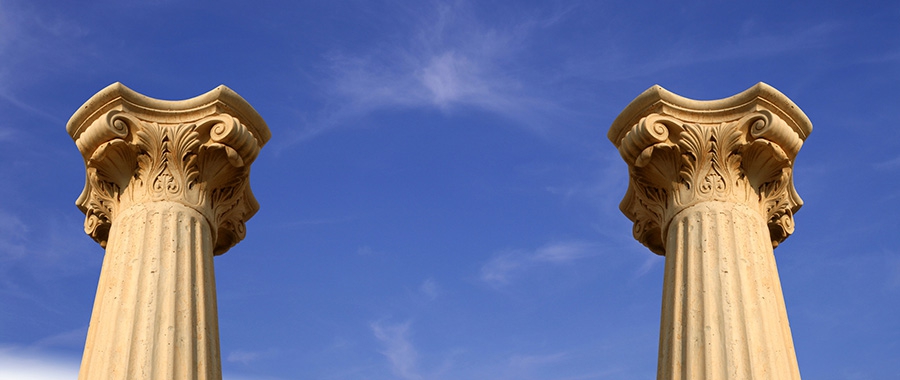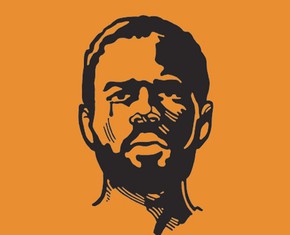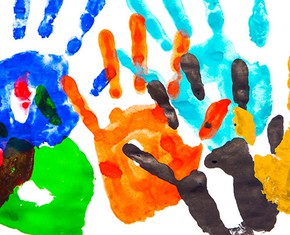The views expressed in our content reflect individual perspectives and do not represent the authoritative views of the Baha'i Faith.
The Baha’i teachings say the twin “pillars” of reward and punishment support the entire paradigm of physical reality.
Alluded to throughout the Baha’i writings as upholding justice in all its myriad forms, this system is a bulwark of the structure of reality. Baha’u’llah wrote:
O people of God! That which traineth the world is Justice, for it is upheld by two pillars, reward and punishment. These two pillars are the sources of life to the world. – Baha’u’llah, Tablets of Baha’u’llah, p. 27.
In some passages it is apparent that the system of reward and punishment represents literal institutions that uphold social order by physically restraining the iniquitous:
Justice hath a mighty force at its command. It is none other than reward and punishment for the deeds of men. By the power of this force the tabernacle of order is established throughout the world, causing the wicked to restrain their natures for fear of punishment. – Ibid., p. 164.
Yet the more deeply we study the relationship of reward and punishment to the enlightenment and advancement of humankind, the more we understand the amazing subtlety and pervasiveness of this training device.
According to the Baha’i teachings, the purpose of the system of reward and punishment, when it is applied wisely by parents and educators of every sort, is to instigate autonomous motion, not to dominate or to oppress. One obvious use of this technique, for example, is so-called “operant conditioning” employed by psychologists and teachers in modifying behavior. Certainly every parent knows that it is virtually impossible to train a child without the wise application of reward and punishment on a regular basis.
But we have also recently become aware of the danger of misapplying such training. Excessive reward and punishment can have precisely the opposite effect of their intended uses—instead of instigating autonomy and self-sustained progress, they can produce a mindless adherence to rules, a sort of fanaticism that destroys human development. In short, these twin stimuli when applied properly become tools of training, not ends in themselves.
The purpose of reward, punishment, and other trainers is to initiate a response—and then to transfer the responsibility for considered, continuing action to the individual. This transference is accomplished when the individual becomes enlightened about the rational and benign objectives that the teaching system upholds. For example, when we understand and adopt the benign objectives of our transformation, external guidance through reward and punishment become less and less important because we internalize the objectives for ourselves, and our own emotional sensibilities reward and punish us: we feel good when we succeed and bad when we fail.
This does not mean that our “conscience” is completely a learned or programmed response, but it does mean that this internal or inherent sense of morality requires nurture and encouragement at the early stages of development, or else it can atrophy beyond repair. Nurturing and training the conscience is accomplished through external application of training until we come to appreciate that the real rewards and punishments derive from both the immediate and the long-term benefits we derive from our own mental and spiritual advancement. The same training principles apply to the shared values we have as a society. The collective conscience can be as successfully trained and developed as the individual conscience.
Here again, we are not trying to catechize, to develop group-think, or to instigate a mindless and mechanical response to reality. The objective is to educate humankind to appreciate the essential reality of human nature so that all might work in concord in the ongoing process of fostering “an ever-advancing civilization.” Social justice when understood in this light establishes its own systems of reward and punishment and attempts to train society to achieve that motion.
Such justice operates whether we are alluding to criminal justice systems to maintain civil order, or to social norms whereby citizens in a community feel the impact of their own behavior in relation to the healthy expectation of their peers. In other words, peer pressure is bad only when the peers reflect the moral climate of a degenerate society. When the society begins to have a shared goal of moral development and spiritually based norms, peer pressure can become one of the most healthy and powerful sources of reinforcement for individual development and progress.
Indeed, it might well be argued that a healthy society or community is the most forceful and effective teacher of its citizenry, a dictum the veracity of which any parent in today’s society will readily attest (and lament). For when society is in moral disarray, the parent discovers the difficulty of shielding children from the omnipresent and pervasive presence of the moribund perspective and perverse mentality of a debased social milieu.
Thus if society does not comprehend and eventually internalize healthy goals, no system of reward and punishment will be powerful enough to enforce order, let alone produce an advancing civilization. Certainly, contemporary attempts at law enforcement and penology confirm this verity. As Abdu’l-Baha noted, effective training cannot be accomplished in a materially oriented system of reward and punishment:
With force and punishments, material civilization seeketh to restrain the people from mischief, from inflicting harm on society and committing crimes. But in a divine civilization, the individual is so conditioned that with no fear of punishment, he shunneth the perpetration of crimes, seeth the crime itself as the severest of torments, and with alacrity and joy, setteth himself to acquiring the virtues of humankind, to furthering human progress, and to spreading light across the world. – Selections from the Writings of Abdu’l-Baha, p. 133.
You May Also Like
Comments

















(The Bab, Selections from the Writings of the Bab, p. 78)